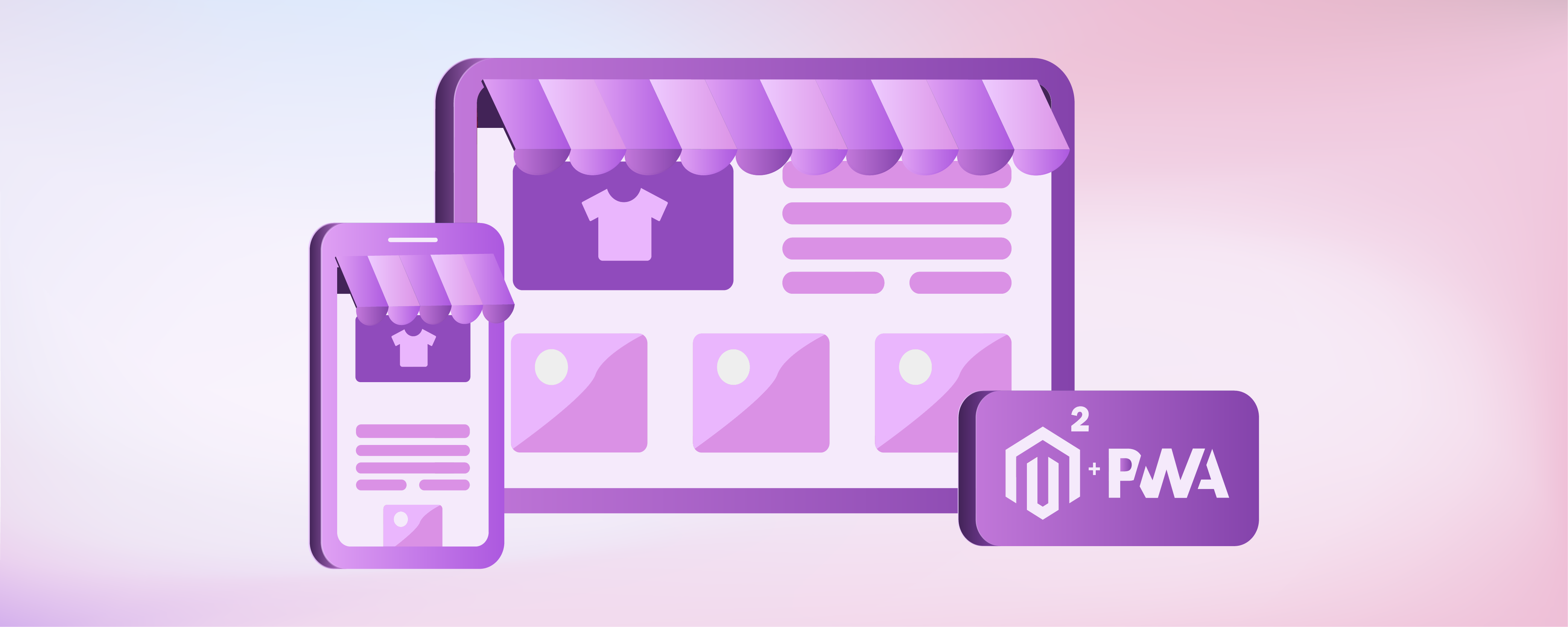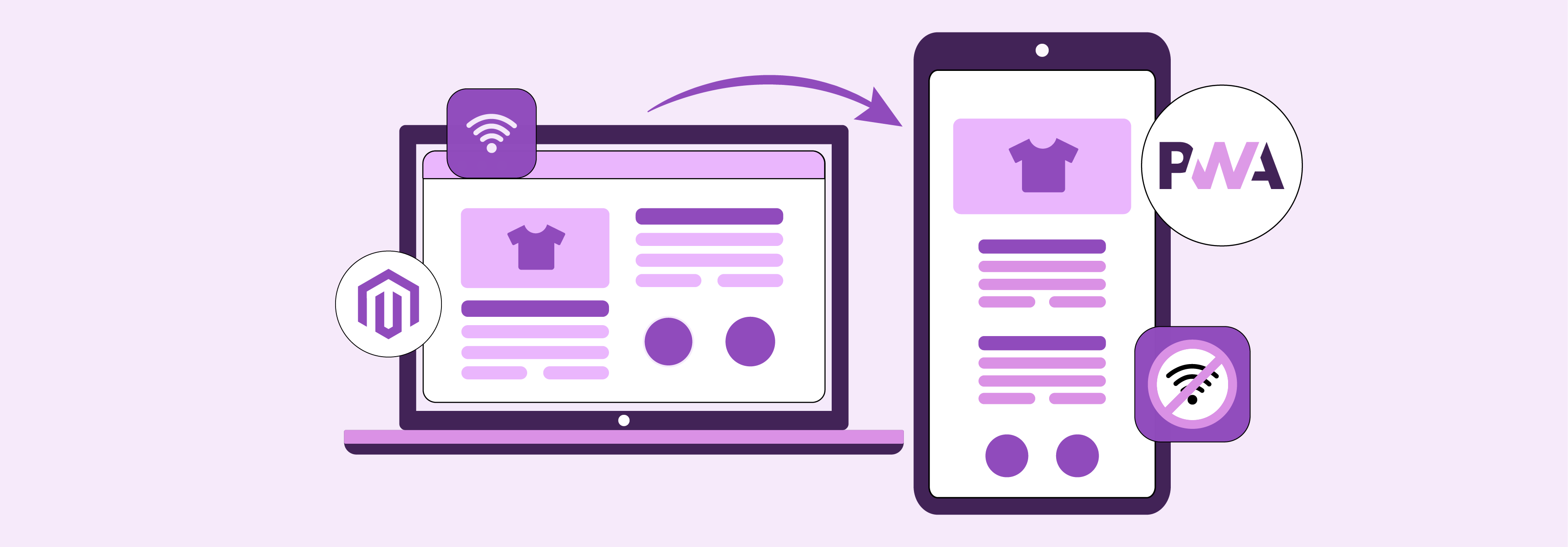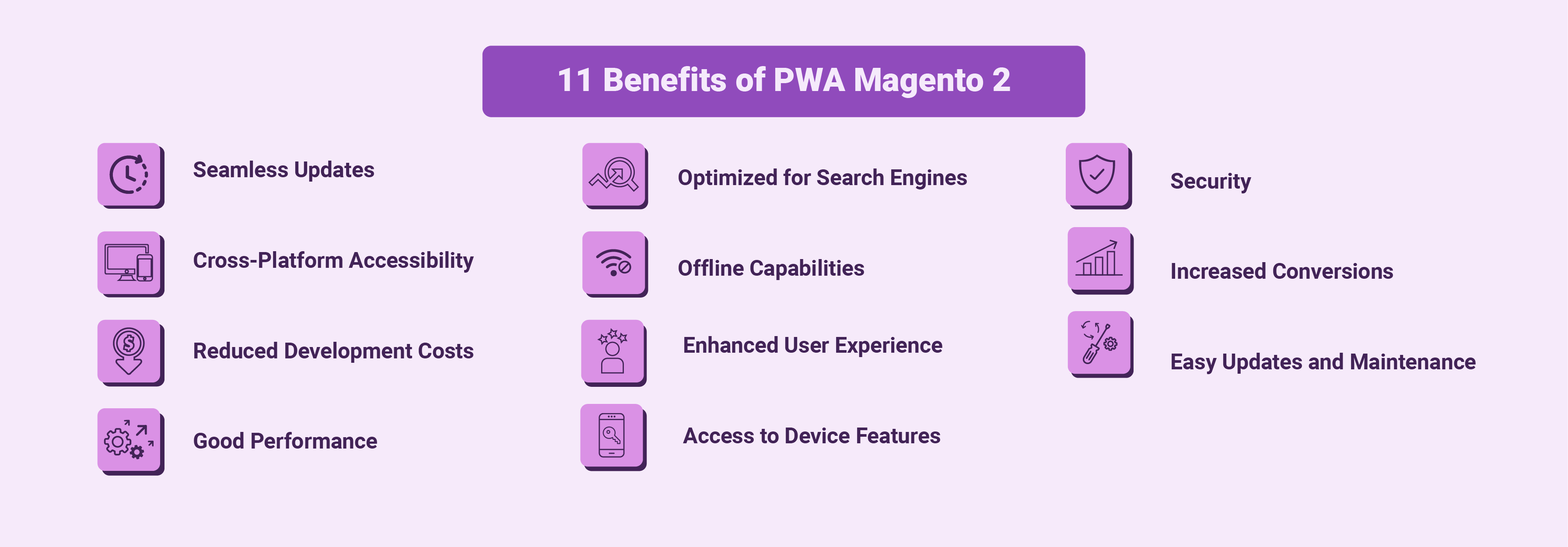
PWA Magento 2 Storefront: Benefits & Development Methods
With a PWA Magento 2, you get the best of both worlds - a native app experience and the flexibility of a website. A Progressive Web App (PWA) applies web capabilities (HTML, CSS, Javascript) to create a fast and reliable user experience that feels like an app. This article will explore the benefits of having a PWA Magento 2 storefront in 2024.
Key Takeaways
-
PWAs combine website flexibility with app-like functionality.
-
PWA development is generally cost-effective and cross-platform.
-
Offline accessibility and push notifications enhance user experience.
-
Magento 2 PWA improves performance, SEO, and conversion rates.
-
Customizable and updateable without app store dependencies.
What Is Progressive Web App (PWA)?

A Progressive Web App (PWA) is a web application that utilizes web technologies (HTML, CSS, JavaScript). It is used to provide a seamless user experience similar to native apps.
PWAs mimic native apps with features like a mobile home screen icon, a splash page on opening, a full-screen display, and push notifications. 3 key features that Magento PWA has:
-
Fast: PWAs should respond to user interactions almost instantly.
-
Reliable: They should be able to work even under poor network conditions.
-
Engaging: PWAs should deliver a smooth app-like experience.
Why Choose PWA Magento 2?
1. Improved Performance
PWAs are built to leverage browser caching effectively. PWA for Magento 2 makes storefronts faster, increasing user satisfaction and boosting conversion rates by reducing load times.
2. Offline Accessibility
One of the most significant advantages of a PWA is its ability to work offline or on low-quality networks. This ensures customers can browse your Magento 2 store despite intermittent connectivity.
3. Mobile-Friendly Experience
With most internet traffic from mobile devices, having a PWA ensures that your Magento 2 storefront delivers a mobile-optimized experience. It includes touch-optimized navigation, swiping, and other gestures smartphone users expect.
4. No App Store Dependencies
Unlike native apps, a PWA must not be downloaded from app stores. This saves users from the hassle of installation and eliminates the need for approval from app stores, streamlining the update process.
5. Enhanced Security
Magento 2 PWAs are served via HTTPS, meaning the data exchange between the user’s browser and the website is encrypted. Enhanced security helps to build trust with your customers.
6. Search Engine Optimization (SEO) Benefits
PWAs are indexable and rankable in search engines. A well-optimized Magento 2 PWA can improve visibility on search engine results pages (SERPs), driving more organic traffic to the store.
7. Push Notifications
With the ability to send push notifications, Magento 2 PWA storefronts can re-engage users effectively. They can remind users of abandoned carts, special offers, or new product releases and increase sales opportunities.
Comparison between PWA and Native App
Sure, here is the information converted into markdown format:
| Factors | PWA | Native App |
|---|---|---|
| Device Accessibility | Available on all devices with a web browser. You can add to home screen. | Specific to platforms (iOS, Android). |
| Installation | No installation necessary; accessed via browser. You can add to home screen. | Requires download and installation from app store. |
| Update Management | Updates deployed directly to the web app. | Users must download updates from the app store. |
| Cost | Generally less expensive to develop. | Typically more expensive due to platform specificity. |
| Operating System Support | iOS and Android. | Specific to OS (iOS/Android). |
| Flexibility & Sharing | High. | Limited. |
| Updates | Automatic. | Manual (via app store). |
11 Benefits of PWA Magento 2

1. Seamless Updates
Magento PWAs allow for updates to be deployed directly to the live web app, removing the need for users to update their apps manually through a mobile app store. This ensures users always access the most current app version without interruption.
2. Cross-Platform Accessibility
A PWA developed using Magento 2 is accessible on any device with a web browser, enhancing customer reach. This cross-platform nature means businesses must develop only one app to cover many devices.
3. Reduced Development Costs
Developing a PWA with Magento 2 is generally less expensive than creating a native app since it negates the need for platform-specific versions. This unified approach to app development can significantly reduce costs.
4. Good Performance
Magento PWA offers good performance with faster load times compared to traditional websites. However, there may be some limitations when compared to native apps. The gap is quickly closing with advancements in technology.
5. Optimized for Search Engines
PWAs enjoy SEO advantages since search engines can index them like a website. This translates to better visibility and discoverability for businesses without relying on app store rankings.
6. Offline Capabilities
Magento 2 PWAs can work offline or on low-quality networks. This is especially beneficial for users in areas with poor internet connectivity. It also helps those looking to reduce data usage.
7. Enhanced User Experience
PWAs offer a seamless experience to users with the ability to send push notifications, add shortcuts on home screens, and leverage device features like cameras and geolocation. This creates a more interactive and personalized experience for customers.
8. Access to Device Features
While Magento PWA has limited access to device features compared to native apps. Ongoing advancements are narrowing this gap. Features like camera access and geolocation are becoming more integrated.
9. Security
Security is a top priority for e-commerce, and Magento 2 PWAs are served via HTTPS. This means the connection between the user and the app is encrypted, offering a secure shopping experience.
10. Increased Conversions
With its fast load times, offline capabilities, and SE, PWAs can increase business conversions. Customers are more likely to purchase when they have a smooth and convenient browsing experience.
11. Easy Updates and Maintenance
Updating a PWA is much simpler and less time-consuming compared to native apps. Businesses can make changes quickly without going through the app store review process. This also allows for better maintenance and bug fixes, resulting in a more efficient and user-friendly app.
Magento PWA Requirements
-
Service Workers: These client-side JavaScript files run in the background of web apps. They cache static files and requests, send push notifications, and update content. Service workers improve app loading times by caching previously saved files and ensuring content accessibility, even with unstable internet connections.
-
Web App Manifest: The web app manifest is a JSON file that outlines the behavior of an app after installation on a device. It includes details such as the app's name, author, and icon appearance.
-
App Shell Architecture: A page skeleton, represented by a static HTML, CSS, and JavaScript structure, is displayed while the remaining content loads. This skeleton acts as the foundation of the page, without any dynamic elements that vary from page to page. See the screenshot from Sophie Conran below for a visual demonstration.
-
Transport Layer Security (TLS): HTTPS is a protocol that ensures secure and authenticated communication between web applications and servers. PWAs must utilize HTTPS to protect personal data, such as names, addresses, and credit card numbers, that consumers entrust to online stores.
-
Application Programming Interface (API): APIs act as intermediaries between the front and back end, facilitating communication and enforcing rules for their collaboration. They employ languages like GraphQL to enable seamless interaction between the two parts.
-
Pop-up Working Principle: PWAs, from a Magento UI/UX perspective, utilize the pop-up working principle. This entails launching a new pop-up for every action, allowing users to remain on the same page and swipe through the overlaying content.
Magento 2 PWA Development Methods
1. Magento PWA Studio

Magento offers PWA as an official solution that enables PWAs on their eCommerce platform. This empowers businesses to enhance their online presence and provide a seamless shopping experience for their customers.
Magento PWA Studio is a developer toolkit that simplifies the creation of progressive web applications. PWA Studio Magento 2 offers several advantages. It provides ready-made components and a flexible front-end architecture, which minimizes errors during the initial stage and ensures smooth progress.
Unlike monolithic solutions, you can select specific code segments instead of the entire package. PWA Studio features a preconfigured application builder and setup service workers. It also offers customizable app elements based on your needs. Additionally, Magento handles routing and caching for you.
Some of the downsides:
-
Cutting excessive code that developers don't apply to the store
-
High probability of unnecessary abstractions or bugs
-
Time is required to study existing solutions to avoid reinventing the wheel.
2. Magento PWA Frameworks

This option is ideal for experienced web developers who want to customize their store fully. Regarding choosing a framework for a Magento PWA, 3 options are there:
-
React.js: React is a versatile and user-friendly JavaScript library for developing UIs. It can be used to build SPAs and PWAs from scratch or modify existing themes. React is also known as ReactJS or React.js.
-
Vue.js: Vue.js is a Javascript library used to create UIs and SPAs. It's open-source, developer-friendly, and lightweight. With Vue.js, coders can develop projects from scratch, access rich official libraries, and benefit from accelerated rendering with its virtual DOM.
-
Angular.js: Angular.js is an open-source Javascript library. It simplifies development and testing. It was introduced in 2010 and is supported by Google. It's flexible and can be customized to meet your needs. Some of its pros include two-way data binding for autonomous data synchronization, improved server performance, and faster application prototyping.
3. Magento PWA Themes

A theme in Magento can transform a website into a Progressive Web App (PWA) by providing pre-designed web pages and coding tools. It allows for front and backend communication through APIs and offers a unified code base for both desktop and mobile.
Magento PWA themes may have limitations and bugs and require updates and customization. However, they provide ready-made solutions for creating a PWA Magento 2 storefront. This reduces coding time and speeds up the optimization process.
Find the list of best Magento PWA themes here.
4. Magento 2 PWA Extensions

Installing extensions is an easy way to enhance a store with PWA features. These extensions offer options like site search, navigation, checkout, and gift cards, resulting in a more responsive and user-friendly website.
While add-ons require a PWA theme, they provide additional functionality to extend your existing setup. Amasty offers a variety of extensions for Magento 2 PWA, allowing you to preview and customize them.
Find the list of best Magento PWA extensions here.
FAQs
1. How to ensure my Magento PWA is installable on mobile phones?
To make your Magento PWA installable, focus on a mobile-friendly design with a responsive layout, ensuring ease of use. Prioritize speed and simplicity with strategically placed buttons and a straightforward menu that enhances user experience.
2. How can mobile commerce merchants improve page loading times for users with a slow internet connection?
Merchants can optimize images, leverage browser caching, and minify code to improve load times. Additionally, implementing lazy loading and choosing a lightweight theme can significantly reduce loading speed on mobile commerce platforms.
3. What are the benefits of using open-source PWA solutions like Scandi PWA or Vue Storefront?
Open-source PWA solutions offer flexibility, a vibrant development community, and cost savings. Merchants can tailor these platforms to unique business needs and benefit from collective advancements in web development for growth.
4. How to minimize bounce rate on my PWA by improving the checkout process on mobile devices?
Optimize checkout by reducing the number of steps, using clear call-to-action buttons, and providing visual feedback for each completed action. Ensuring compatibility with popular browsers like Chrome and Safari can also help keep the bounce rate low.
5. What are common mistakes when creating a PWA, and how to avoid them?
A frequent mistake is not focusing on mobile-first design principles, which can lead to a poor user experience. Other issues include overlooking proper testing across devices and neglecting SEO best practices. Avoid these by prioritizing front-end development and conducting thorough testing.
6. Do PWA themes guarantee compatibility with existing Magento extensions, and how to address Adobe Commerce issues?
While PWA themes aim for broad compatibility, conflicts can arise. If facing issues with Adobe Commerce, review documentation for guidance, contact providers for support, or consider customization services to address specific compatibility concerns.
7. What steps to consider when shifting to mobile commerce with PWA for an existing Magento store?
Merchants should start by assessing their current store against PWA capabilities, considering user sessions, load speed, layout, and overall mobile responsiveness. Next, review PWA examples, gather resources illustrating best practices, and create a step-by-step project roadmap with these insights in mind. Optimizing Magento hosting is important for site speed, uptime, and overall PWA performance, directly impacting user experience.
Summary
PWA Magento 2 enhances mobile user experience with faster load times and improved accessibility. With an intuitive layout and seamless navigation, PWA can provide a convenient shopping experience for customers and increase conversions.
Managed Magento hosting optimizes PWAs with customized infrastructure and support for peak performance and scalability.


